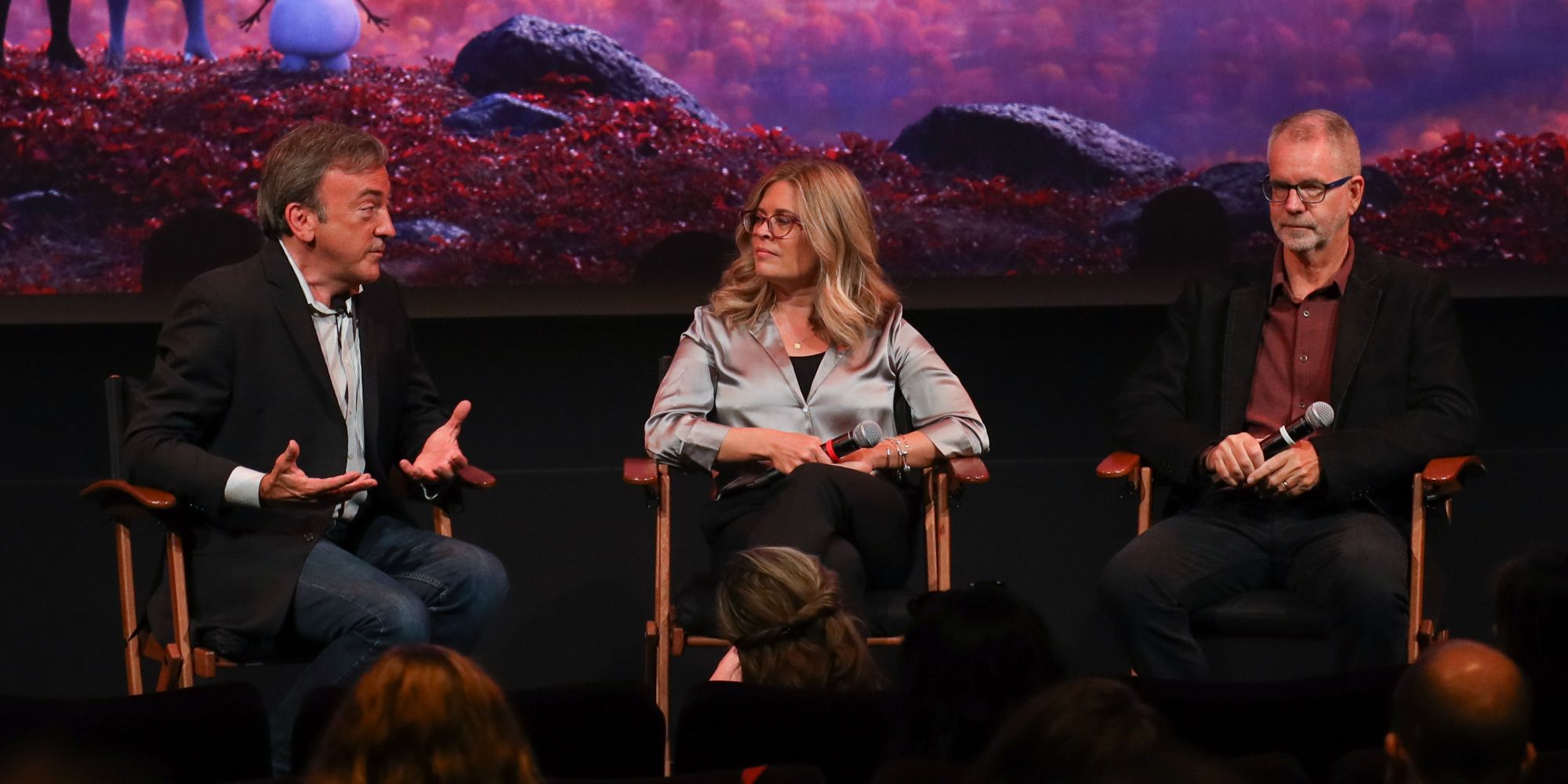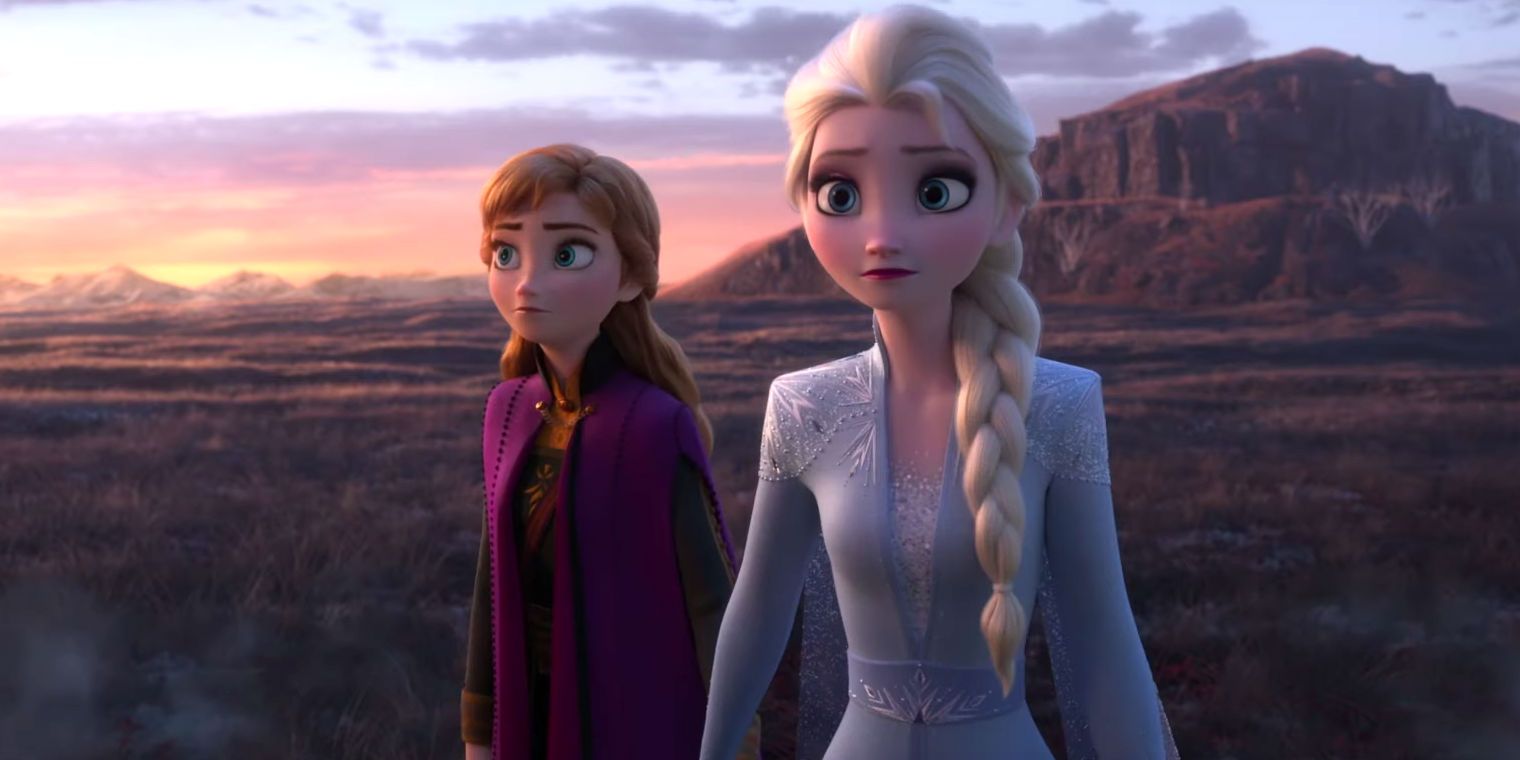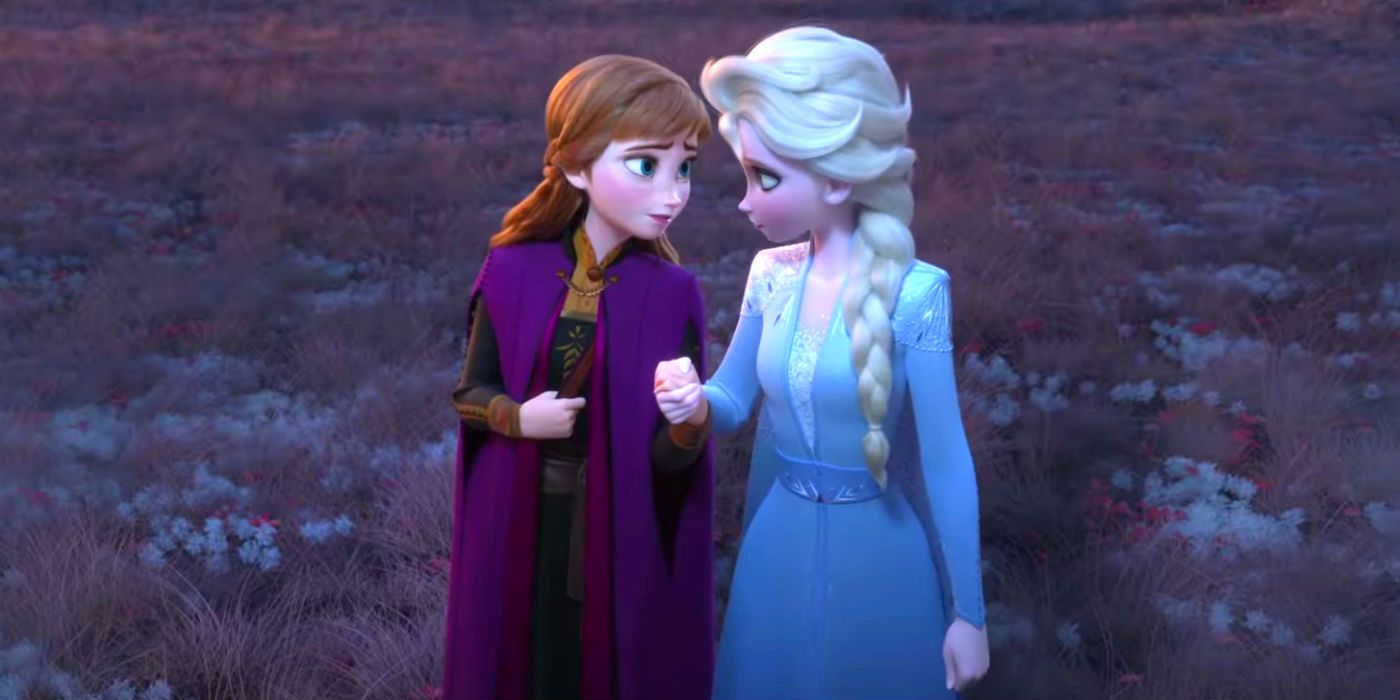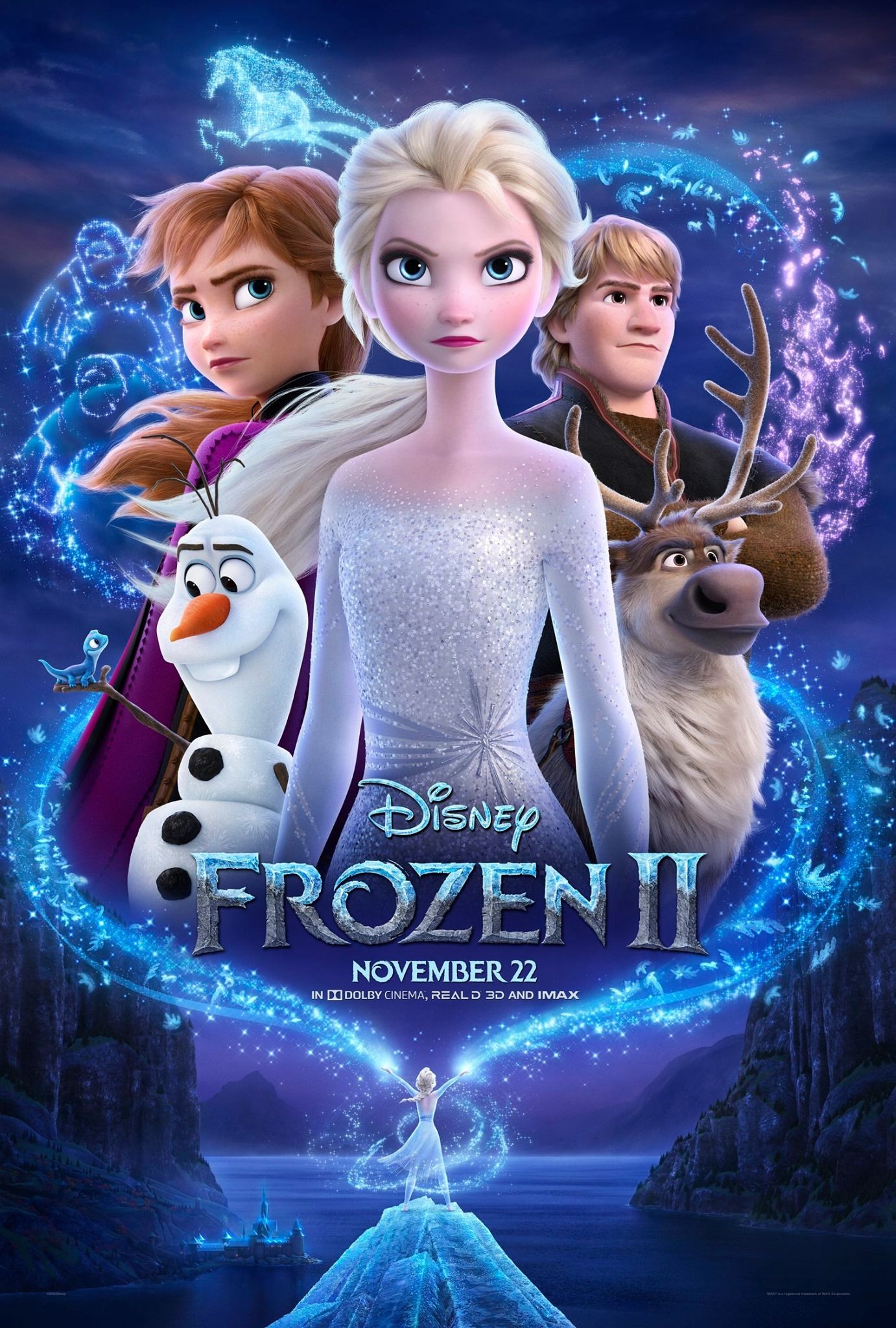Frozen 2 comes six years after the first Frozen released in theaters, and writer-director Jennifer Lee, director Chris Buck, and producer Peter Del Vecho are excited to bring Anna and Elsa's latest adventure to the big screen. The story itself takes place only three years after the first film, but it has ties to what happened to Anna and Elsa's parents as well as the magical spirits to the north in the Enchanted Forest.
It's taken over four years to bring Frozen 2 to theaters, and it not only continues the story that left off in the first movie but expands it in numerous ways, introducing various magical creatures and an entire land that brings about several possibilities. So in order to craft the story and world of Frozen 2, the filmmakers took a trip to Norway, Finland, and Iceland; each place inspired a different part of the journey that Anna and Elsa take in the sequel.
Screen Rant and other entertainment outlets were invited to an early press day for Frozen 2 at Walt Disney Animation Studios in early September, and after a brief footage presentation, Lee, Buck, and Del Vecho answered some questions from attending journalists about the new film in a Q&A session.
At the end of the first movie, Elsa was so empowered by her powers and learning to have controlled them. In this movie, now she has that and the forest spirits are mad at her. So isn’t that always the way you solve one problem, and someone else crops up and wants something else. Is that sort of in your...
Jennifer Lee (Writer/Director): That is life. I think that’s a good part of what we’re looking at is, we always say, is there such a thing as happily ever after? We all know that just as you’ve got things worked out life throws you a curveball or a new path. And we haven’t looked at that yet, sort of like how do you cope when life just changes abruptly. But also, you know, that idea that Elsa, while she’s been accepted which is beautiful, there has got to be more to what’s going on inside her. And having to answer that call in life, the thing that speaks to you. It’s scary, can be dangerous – depending – but it’s an important thing to explore, so.
Two questions. One, what were your forest spirits on this movie? What were things that cropped up because of the success of Frozen 1? Two, there was an entire season of Once Upon A Time that was a Frozen sequel. Was any of that canon to you?
Jennifer Lee: In terms of the second question first, and then the first. No, that’s not canon. We didn’t see it. So I kinda made a point of certain things not to see so it wouldn’t affect us that way. Frozen 1 and Frozen 2 to me are one complete story and that’s really where we stay. So glad they had fun with that. I think they had a lot of fun with the characters, but.
Chris Buck (Director): Our forest spirits. That’s a tough one. I mean, the exciting thing about doing the sequel, though, was to be able to tell more of the story as opposed to... We didn’t wanna listen too much of what was out there in the zeitgeist of everybody, what their wishes for the next movie were. But we wanted to tell the story that was true to the characters and we dug in, and we got excited about doing the sequel when we did a short call of Frozen Fever, and we have a few months off of, you know, Frozen, and none of those characters. And when we started to see the characters alive again in animation we both went, oh my gosh, I love these. I love this world. I love these characters. So we knew we had more story to tell and we wanted to do that.
I think you guys encountered your own form of forest spirits in Norway and Iceland.
Jennifer Lee: Yeah, actually the fun part in what inspired us. We were doing research into old Norse myths and old folklore of Scandinavia. And thinking of Elsa’s powers as of nature. And so we, you saw on the research trip, we had very different experiences that helped us a lot. But in Norway and Finland – in Finland we did an 8 mile hike through a forest that was very much feeling like it was coming alive as we went, with all the tales and those rocks were thrown by giants. There’s hidden folk underneath those rocks. You have to ask the spirits if you want to do something and they’ll answer. And the joke of it was they didn’t seem to like me in the Norwegian forest. I ripped my pants, falling down, everything went wrong for me in Norway. Chris was skippin’ along...
Chris Buck: Oh, I had a great time in Norway. Amazing. And I know I felt like, again, Norway and Finland feel like this very fairytale world and it’s very cozy and warm and wonderful. Of course, we were there in the fall, so it was beautiful. And then we compared our stories. Then we go to Iceland and – well go ahead, you tell your story, because it was a different experience.
Jennifer Lee: So, I get to Iceland and I’m not a great flyer. I get afraid of things. And this was this incredible land that was alive. It could kill you at any turn. There were like jokes about that. Like man is definitely not in charge. And I was, like, I’m home. I’m completely fine with this. I will go into the volcano. I will walk in the glacier. Yeah, I know you could slip and die if you go down that crevasse. I don’t care. I’m here. But he had...
Chris Buck: I love adventurous things, but I don’t know, when you’re there every second you feel like you’re gonna die. I’d rather take that cozy fairytale place.
Jennifer Lee: So we realized we’re like Anna and Elsa on the trip. And so I guess we faced... Iceland for me, a lot of story in terms of Elsa’s journey came out well on that trip. So...
Chris Buck: Yeah, one could really see it. And there was...
Jennifer Lee: So you gotta face real spirits.
Chris Buck: There was some video in the research trip where we- the dark sea. Inspired the dark sea. The color palette and the sort of black sand and there’s big dark stones coming out of the water. And that very much inspired it. What is the name of that sea? Do you remember?
Jennifer Lee: I think it was the Black Pebble Beach is what they call it.
Chris Buck: Anyway, there was, again, a lot of things that you saw even today, just the clips, were inspired by that trip.
Peter Del Vecho (Producer): I think that trip not only inspired visuals in the world, but it did something else. Just immersing us 24 hours a day in that environment, our imaginations truly were piqued. And so a lot of story ideas developed during that trip as well.
Because of the fandom, do you feel pressure making this film? What kind of mindset did you have going into?
Jennifer Lee: Yeah, we made a pact when we connected with Bobby and Kristen. We were just about a year out and didn’t know it would be picked up by later generations. We’re still naïve in that sense a little bit. But we made a pact that we would build the second one the same way as the first, and not let that pressure into the story room. Because every song has to come from the story, just like it did before. Every moment has to be true. And any time anyone of us were nervous - like I heard this, I heard that - we would just ground each other. And I think we had to or it wouldn’t be an authentic story. But I think in many ways at the end of the day we- just like we didn’t know what the world would think of Frozen. We can’t know, but we can know that we did build this the way we believed in and there’s a lot of real emotion and real sharing of experience and real sort of story that was driven the way the first one was.
Chris Buck: And I think the response from the audience was actually very exciting because the audience loved the characters as much as we did. So it showed that, we wanted to tell more story and we felt that the audience wanted to know more of the story. So that propelled us and that kept us going.
You were talking about happily ever after. That was an idea that Disney movies always sought for many, many years. And now you are doing more with how life really is. Do you think it’s not good to teach kids that living happily ever after is something that’s never gonna happen?
Jennifer Lee: I don’t think that. I think it’s a combination of what the fairytale narrative does and then how you can play with it. Fairytales are ultimately about, well for children in the sense originally where what you do is you take an ordinary person and you put them in something crazy and unknown, in the belly of the beast, and you make great obstacles for them. But you show them how to persevere and come out the other side. And the happily ever after idea is that thing of saying you can survive anything. And I fundamentally believe in that. I think what was fun to do, though, we flip tropes a lot in Frozen 1, is to play with those tropes again and say, okay, well we don’t live happily ever after for the girls in that sense that they have come out the other side of some great struggle much stronger. And then we’re taking it a step further and going, yeah, but they’re still here and what can life throw? But that was worth exploring as well. But I think there are different things and they serve different purposes.
So nothing with a prince charming…?
Jennifer Lee: We try not to do tropes – in Frozen 1, we put in tropes in there to flip them. Like Hans was not the answer. That was fun. So this is saying, okay, let’s look past happily ever after and explore it.
You said there were seven new songs. Do Anna and Kristoff get their own song?
Chris Buck: We won’t say what the song is. What’s great about this version of the story is they each have a song in the movie, each of their needs.
Jennifer Lee: Elsa has two.
Chris Buck: Which you heard one. She has another one later.
Jennifer Lee: We can’t tell you what they sing. Actually, they all have very powerful songs in the sense of they’re not just driving the story forward but I think Bob and Kristen really out did themselves. It’s extraordinary music.
Chris Buck: And yes, Kristoff does get a whole song this time.
You talked about Elsa being a mythic character. Were there any specific folk tales or literary examples that inspired that?
Jennifer Lee: Yeah, we did a lot. I mean, I read a lot of books, went back to Hans Christian Andersen, but even deeper into some of the old – even deeper, older folklore. And some of the song stories that were indigenous to Scandinavia. And interestingly, because Iceland was mostly founded by Scandinavian folks, there’s a bit of a bridge. But what I discovered – and I don’t have a specific one. And then the Nokk stood out a bit because the Nokk had come from old Norse myths and the wind spirit from the Nordic region and Scandinavian culture. The fire spirit, which I can’t say what it is yet, have come from that. And then – oh what am I missing? Oh the earth. We were walking in Norway, the concept there were earth giants throwing rocks around and things like that. And so that was awe inspiring. But the big thing was the discovery.
I know we joke that we knew this in Frozen 1, but we didn’t, which was the mythic story is a tragic story and it’s about a super, sort of superhuman character, someone with special powers who carries our sins and our flaws and our mistakes for us. And then usually has a tragic fate. And I looked at Frozen 1 and we’re talking and we said in Frozen 1, Elsa would have had a tragic fate, and so would the world have. Imagine if Hans had killed her and the storm raged on. That would have been the mythic version. But the fairytale of Anna came in and saved the day. And the power of the two of those tug of warring together was the biggest discovery. And that really came from the research about the difference between a myth and a fairytale.
Did you consider having a single, big bad villain in this film?
Jennifer Lee: You know, it’s interesting. We’ll let you see when you see it who you think the villains and antagonists are in this. There are certainly a lot of antagonistic forces. Frozen 1 had a thematic villain – fear versus love. We have a lot of great Disney films and we will continue to do so, and I believe in the Disney flipping tropes in the writing, and that was important to Chris. So we can say this, in terms of obstacles, antagonism and villainous forces, we’ve got that. But we’re gonna do it the Frozen way. Put it that way.
Chris Buck: And one thing that first film and the second film, it really boils down to Anna and Elsa and their relationship. And that real and the struggle between, you know, siblings and people who are very close. You’ve got your own sort of antagonists right there, so every time we would stray we’d always go back to Anna and Elsa and use them as the core of that. And that would always really land beautifully.




